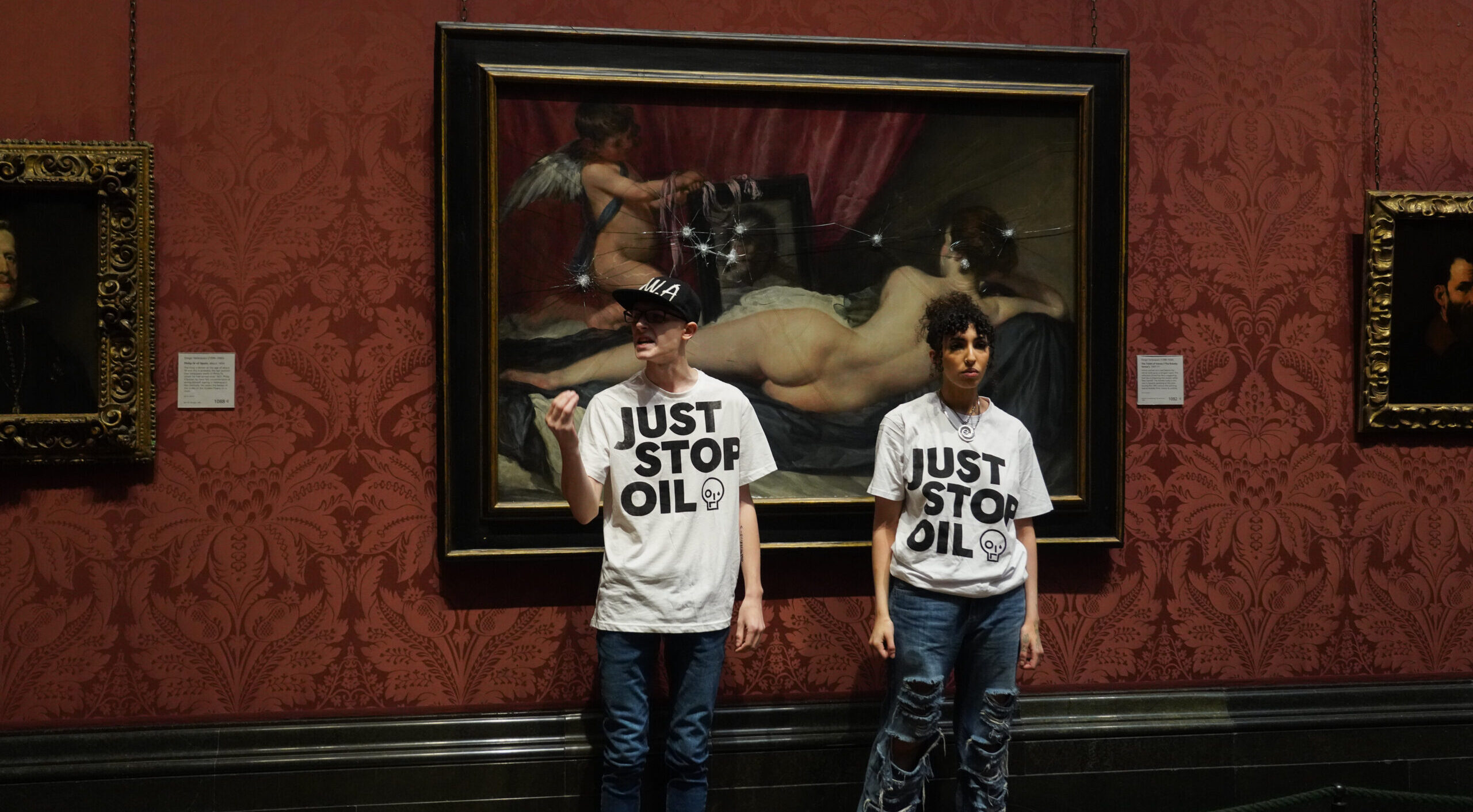The National Gallery in Trafalgar Square is not particularly large — a little over 2,000 paintings. But it contains a truly superlative example of almost every significant moment in European painting. You go to the Uffizi or the Prado to see the treasures of a national culture; the National Gallery shows you many of the glories of European painting, from the Middle Ages to the Great War.
It’s free to enter, a very unusual thing among world-class museums. Whoever you are, you can develop an ordinary relationship with the greatest art. It’s an enormous privilege, and there is a silent contract involved. The institution lets the ordinary person in for nothing. In return, the ordinary person undertakes to behave in an ordinarily respectful way. Mostly, it works.
On Monday morning, two members of environmental campaigning group Just Stop Oil entered the gallery. They went to room 30, seeking out Diego Velázquez’s painting The Toilet of Venus. The painting is behind glass, unlike most of the gallery’s holdings. The two campaigners, in their early twenties, produced hammers and started beating on the glass, which splintered but did not shatter. They shouted some incoherent slogans. The guards hovered. Understandably, they did not closely approach two armed and unstable people. The damage caused by the attack is not yet known.
There was an ancient Greek called Herostratus who burnt down the Temple of Artemis in Ephesus, thinking it would make his name known to posterity. In the same spirit, Just Stop Oil gave a statement after yesterday’s stunt, naming the two iconoclasts. It also pointed out that the painting had been attacked before, in 1914, by a suffragette called Mary Richardson who slashed it repeatedly. (They apparently didn’t know that she went on to head the women’s section of the British Union of Fascists.) It was not, however, thought necessary to name Velázquez, who many people, including me, consider the greatest painter who ever lived.
All oil paintings are unique, but the uniqueness of the Velázquez Venus is more marked than most. There are only a hundred or so paintings by the artist in existence. One of the most breathtaking things about them is his virtuosity in painting flesh: the texture of the skin — of a face, hands, very occasionally a woman’s neck — is rapturously rendered. In Spain in the 17th century, a female nude was a rare thing, and Velázquez’s Venus is the only one he painted, as far as we know. It’s a miracle of display and concealment, of a glance caught in a mirror, of the glory of flesh. And on Monday two adolescents struck it with hammers.
While the National Gallery bravely resists calls for change, its first duty is not to the openness we all value, but instead the protection of the treasures within its walls. It might conceivably have to demonstrate to a Spanish government that Velázquez is still safe in London. In-room security might have to be beefed up. More paintings might be encased in glass. A safe distance may be necessary between the visitor and the brushwork of each painting.
Perhaps entry will only be possible with verified ID; perhaps the casual visitor will be discouraged with the imposition, as with everywhere else, of an entrance fee. It would all make perfect sense, and the long and glorious period of universal and easy access to the greatest culture would be over.
What should be done? The usual punishments would be received by these fanatics as badges of honour. Why not compel them to write 15,000 words on the circumstances in which Velázquez produced this painting between 1647 and 1650? To such ignorant people, it might act as a genuine deterrent. But we are going to have to accept that culture is vulnerable, and these acts of destruction might lead to new walls of privilege — and exclusion.











Join the discussion
Join like minded readers that support our journalism by becoming a paid subscriber
To join the discussion in the comments, become a paid subscriber.
Join like minded readers that support our journalism, read unlimited articles and enjoy other subscriber-only benefits.
Subscribe